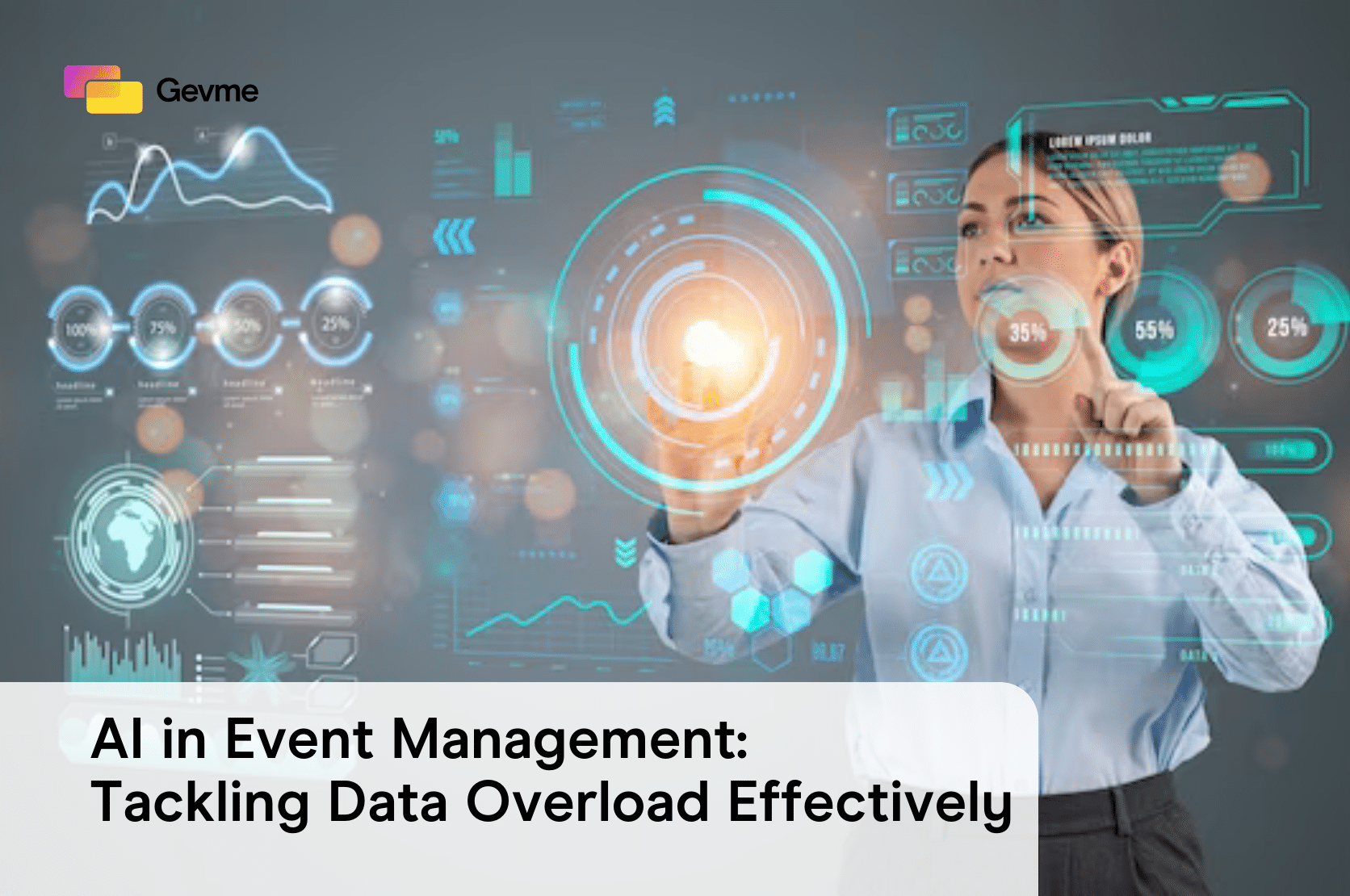In the dynamic sphere of event management, professionals often grapple with the challenge of data overload. With the influx of information from various sources, managing and making sense of this data becomes a daunting task. However, the integration of AI in event management offers a practical and effective solution, transforming the way event professionals handle vast amounts of data.
This blog will explore how AI in event management effectively tackles data overload, streamlining the process and enhancing decision-making, leading to more successful and manageable events.
Understanding Data Overload in Event Management
Data overload in event management presents a significant hurdle in organizing successful events. This overload stems from various sources and impacts the efficiency of event planning:
- Variety of Data Sources: Event managers handle a diverse range of data sources, including attendee registrations, feedback forms, social media interactions, website analytics, and communication platforms. Each source generates different types of data, varying in format and complexity, requiring specialized handling and analysis.
- High Volume of Attendee Information: Attendee information encompasses a wide array of data points such as personal details, attendance history, engagement levels, session preferences, feedback responses, and special requests, all of which need to be managed effectively to personalize the event experience.
- Complex Logistics Data: Logistics management involves intricate data such as venue details, floor plans, transportation schedules, accommodation details, equipment rentals, and catering arrangements. Coordinating these elements requires analyzing and processing a large volume of detailed information.
- Financial Data Management: Financial management in events covers various aspects like budget planning, expense tracking, sponsor funding, ticket sales revenue, vendor payments, and financial reporting. Ensuring accuracy and compliance in this data is crucial for financial transparency and event success.
- Vendor and Sponsor Information: Managing vendor and sponsor relations involves detailed contract management, performance tracking, communication history, deliverable timelines, and payment schedules, necessitating an organized approach to handle this multifaceted data.
- Real-Time Data Processing Needs: Handling real-time data such as attendee check-ins, session occupancy, live polling results, and social media interactions requires quick processing capabilities to make timely decisions and adjustments during the event.

AI: A Tool for Data Management and Analysis
In the intricate world of event management, AI emerges as a sophisticated tool, transforming the daunting task of data handling into a streamlined and insightful process:
- Data Organization: AI in event management is exceptionally adept at meticulously organizing extensive data sets. It categorizes and arranges complex information, from intricate attendee details to multifaceted vendor contracts, into a coherent and accessible format. This sophisticated organization extends to cross-referencing and correlating data from different sources, providing a comprehensive and unified view that is invaluable for efficient event planning.
- Advanced Data Analysis: AI’s role in data analysis is transformative, employing sophisticated algorithms to delve into extensive datasets. It identifies subtle patterns and correlations that might go unnoticed in manual analysis. This involves interpreting complex attendee engagement metrics, financial expenditure trends, and logistical data, translating these into actionable insights that can shape event strategies and decision-making processes.
- Automated Data Processing: The automation provided by AI in data processing encompasses a wide range of tasks. This includes the automated classification of data, trend analysis, predictive modeling, and generating detailed reports. These tasks are performed with a level of accuracy and speed unattainable by manual processes, significantly reducing workload and enhancing the efficiency of the overall event management process.
- Predictive Insights: AI’s predictive insights are based on complex algorithms that analyze historical event data, current market trends, and real-time attendee feedback. This predictive analysis is crucial in forecasting future attendee behaviors, potential logistical issues, and resource needs, facilitating a more proactive approach to event planning and management.
- Customized Reporting: AI’s capability in customized reporting involves generating detailed, insightful reports tailored to the specific needs and goals of each event. These reports encompass a wide range of data, from financial performance and operational efficiency to attendee satisfaction and engagement metrics, offering valuable insights that drive strategic planning and decision-making.
- Enhancing Data Security: AI significantly enhances data security in event management by continuously monitoring data integrity and security. It employs complex algorithms to detect anomalies, unusual patterns, and potential security breaches, providing real-time alerts and enabling quick response to protect sensitive data.

Enhancing Decision Making with AI
AI in event management empowers event managers with the ability to make smarter, data-driven decisions:
- Informed Strategic Decisions: AI offers deep insights into various aspects of event management, from attendee preferences to vendor performance. This enables event managers to make informed decisions on aspects such as venue selection, theme choices, and marketing strategies, ensuring each decision is backed by comprehensive data analysis.
- Identifying Key Performance Indicators (KPIs): AI’s advanced analytics pinpoint the most impactful KPIs, aiding event managers in understanding attendee engagement levels, marketing ROI, and operational efficiency, thus enabling focused efforts on areas that significantly impact event success.
- Optimizing Resource Allocation: AI’s detailed analysis of past and present data assists in allocating resources more efficiently. This includes smart budget distribution, precise staffing needs, and optimal use of venue space, ensuring that every resource contributes effectively to the event’s success.
- Improving Attendee Satisfaction: By meticulously analyzing attendee feedback and behavioral patterns, AI guides event planners in making adjustments that directly cater to attendee needs and preferences, enhancing overall satisfaction and experience.
- Risk Assessment and Mitigation: AI’s ability to assess risks involves analyzing potential issues, from attendee safety concerns to operational challenges, providing event managers with strategies to mitigate these risks proactively.
- Long-Term Planning Insights: AI provides strategic insights for long-term planning, including identifying future trends in attendee preferences, emerging themes in the event industry, and potential operational improvements, ensuring the long-term success and relevance of events.

AI in Personalizing Attendee Experiences
AI’s role in personalizing attendee experiences is transforming event management:
- Tailored Event Journeys: AI’s deep learning algorithms analyze a wide array of attendee data, including past event interactions, session selections, and engagement patterns. This information is used to curate personalized event journeys, recommending sessions, workshops, and networking events that align with each attendee’s unique interests and professional goals.
- Personalized Communication: Leveraging AI, event communication platforms can deliver personalized messages and updates to attendees. This includes customizing information based on their preferences, session choices, and engagement history, ensuring that each attendee receives communication that is relevant and engaging to them.
- Dynamic Content Delivery: AI continuously adapts event content to suit real-time attendee feedback and engagement levels. This dynamic approach to content delivery ensures that presentations, discussions, and activities remain relevant and engaging throughout the event.
- Improved Networking Opportunities: AI analyzes attendee profiles, including their professional background, interests, and networking goals. It uses this data to facilitate more meaningful networking matches, connecting attendees with similar interests, enhancing networking opportunities, and improving overall event satisfaction.

- Enhanced Accessibility Features: AI-driven personalization extends to accessibility, where it adapts features such as language options, subtitles, and audio descriptions to meet the diverse needs of all attendees, ensuring an inclusive and accessible event experience.
- Feedback Analysis for Future Personalization: Post-event, AI’s analysis of attendee feedback is integral in refining and personalizing future events. It evaluates satisfaction levels, preferences, and engagement, using these insights to tailor subsequent events to better meet attendee expectations and enhance their overall experience.
Streamlining Operations with AI-Driven Insights
AI in event management profoundly transforms and optimizes operational processes, making them more efficient and effective:
- Efficient Resource Management: AI delves into intricate data analysis, studying patterns in resource usage over time, attendee behaviors, and specific event requirements. This comprehensive analysis allows for the meticulous planning of resources, ensuring they are allocated where most effective.
- Streamlined Vendor Coordination: AI’s contribution to vendor management encompasses not just coordination but also performance monitoring and compliance management. It handles complex logistics, tracks vendor deliverables against timelines, and ensures alignment with event standards.
- Dynamic Event Scheduling: AI’s approach to event scheduling is proactive and adaptive, analyzing attendee feedback, participation rates, and even environmental factors. This results in a flexible schedule that maximizes attendee engagement and accommodates unforeseen changes.
- Optimized Staff Deployment: AI’s predictive capabilities in staff deployment account for numerous variables, including projected attendee flow, event scale, and specific activity peaks. This ensures that staff is effectively positioned to manage the event smoothly and respond to attendee needs promptly.
- Enhanced Operational Efficiency: AI’s role in enhancing operational efficiency is multi-faceted, identifying potential areas for improvement, streamlining event processes, and reducing operational delays. This leads to a more efficient, productive, and successful event execution.
- Cost-Effective Solutions: AI aids in crafting cost-effective operational strategies by analyzing financial data, supply chain logistics, and operational workflows. It identifies areas where costs can be optimized without compromising the quality or integrity of the event.
AI in Predictive Analytics for Event Planning
The use of AI in event management, especially in predictive analytics, significantly elevates the strategic approach in event planning:
- Forecasting Attendee Behavior: AI analyzes extensive historical data, including past attendee engagement, feedback, and behavior trends, to accurately predict future event dynamics. This involves forecasting the popularity of different sessions, understanding peak times for venue traffic, and predicting overall attendee participation patterns.
- Resource Usage Prediction: By examining previous events’ resource utilization, AI anticipates future resource requirements. This predictive capability spans various aspects, such as predicting the amount of materials needed, the optimal allocation of venue space, and forecasting staff requirements to ensure efficient and cost-effective resource management.
- Event Trend Analysis: AI thoroughly analyzes current and emerging trends in the event industry, including attendee preferences, popular event themes, and new technology adoptions. This analysis helps in predicting future trends, allowing event planners to stay ahead of the curve and design events that align with upcoming market demands.
- Financial Forecasting: AI’s financial forecasting involves predicting revenue streams such as ticket sales and sponsor contributions, and analyzing potential financial outcomes. This aids in creating more accurate budgets, ensuring better financial management, and identifying potential areas for increased revenue generation.
- Risk Prediction and Management: AI evaluates various risk factors in event planning, from operational to safety concerns. It not only identifies these risks but also provides data-driven strategies for risk mitigation, enhancing the overall security and success of the event.
- Enhanced Vendor Management: Utilizing predictive analytics, AI helps in making more informed decisions regarding vendor selection and management. It assesses vendor reliability and performance, predicts future performance based on past data, and suggests optimal vendor strategies.

Challenges in Implementing AI for Data Management
Implementing AI for data management in event planning comes with its own set of challenges:
- Technical Integration Complexities: Integrating AI into existing event management systems can be technically complex. This complexity includes ensuring compatibility with current data formats, upgrading infrastructure to support advanced AI functionalities, and the need for ongoing maintenance and updates.
- Data Privacy and Security Concerns: Utilizing AI requires handling sensitive data, raising significant privacy and security concerns. Event managers must navigate various data protection regulations, implement strong cybersecurity measures, and continuously monitor data security to prevent breaches.
- High Initial Investment: The initial cost of AI implementation can be substantial, involving expenses for software acquisition, system upgrades, and hiring or training staff with the requisite AI expertise. This financial burden can be especially challenging for smaller organizations with limited budgets.
- Training and Adaptation: Integrating AI into event management requires significant organizational changes. This includes training staff to use new AI tools effectively, adapting existing workflows to incorporate AI processes, and fostering a culture open to technological changes.
- Data Quality and Accuracy: The effectiveness of AI is heavily reliant on the quality and accuracy of the input data. Ensuring data accuracy involves implementing stringent data collection and processing standards, regular data audits, and addressing any issues of data inconsistencies or inaccuracies.
- Balancing AI and Human Decision-Making: Finding the right balance between AI-driven decisions and human judgment is crucial. While AI can process and analyze large data sets, human oversight is essential for interpreting results and making nuanced decisions.
The Future of AI in Event Data Management
The future of AI in event management, particularly in event data management, holds transformative potential:
- Enhanced Data Processing Capabilities: AI will likely offer unprecedented data processing capabilities, effortlessly handling increasingly complex and voluminous data, enabling more nuanced analysis and insights.
- Sophisticated Predictive Analytics: Expect AI’s predictive analytics to become more advanced, providing deeper, more accurate insights into attendee behaviours, market trends, and operational efficiencies.
- Seamless Integration with Emerging Technologies: AI’s integration with emerging technologies like IoT, VR, and AR is set to offer a comprehensive data management experience, enriching event planning and execution with multi-dimensional insights.
- Automated Real-Time Decision Making: Future AI tools are anticipated to facilitate automated, real-time decision-making, allowing for instantaneous responses to live event data, enhancing adaptability and responsiveness.
- Increased Accessibility and User-Friendliness: AI tools in event management will likely become more accessible and user-friendly, encouraging broader adoption across the industry, regardless of technical expertise.
- Ethical AI Development: There will be an increased emphasis on developing ethical AI solutions, focusing on maintaining data privacy and security, ensuring responsible and trustworthy AI applications in events.

Conclusion
As we look toward the future of event management, AI in event management stands as a key player in navigating the challenges of data overload. It offers a pathway to more efficient, accurate, and tailored event planning experiences. Platforms like Gevme are already harnessing the power of AI in event management, integrating these technologies to enhance their event management solutions without overwhelming users. The continuous evolution of AI in event management promises to further refine and revolutionize the way we manage and utilize data in events, leading to more successful and impactful outcomes.








